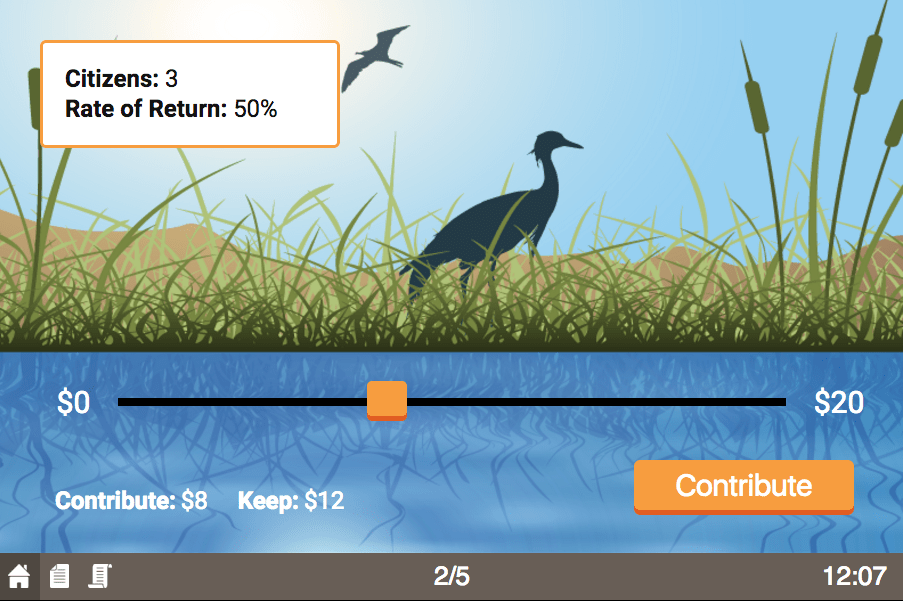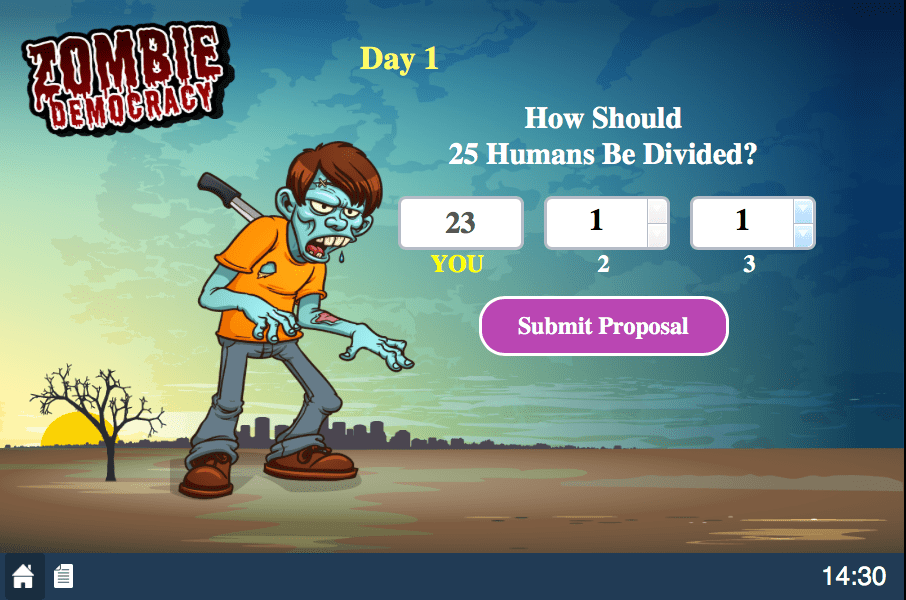MobLab has a number of classroom experiments related to political science classes.In addition to our games, we also have a survey technology where you can run polls in class (similar to Clicker, TopHat, Poll Everywhere, etc.). Currently we have been used in Intro to Political Science, Comparative Politics, and Political Game Theory courses. Our games touch on a number of topics (and we also have a survey technology to run polling questions and survey-based experiments):
In each outline below, I link to our game guides and (where applicable) to our module guides. If you already have an account, you can check these games out in the game library. If you don’t have an account, create one. It’s commitment free and gives you access to all the materials. Here is the link to sign up.
Free Rider Problems – Our linear public goods game embeds students in a group with others. Each student has an endowment of money to keep or donate to a water sanitation project. It is privately optimal to keep money, but socially optimal to donate. This game illustrates the tension between what is good for the individual and what is good for the group. Across rounds, students often follow their dominant strategy to free-ride. In our public goods module, we suggest enabling communication too. When students can talk to each other you observe increased cooperation. This can open up discussion about social capital, differences between close-knit communities and larger communities, etc.

Commons Problems – Our commons fishery game embeds students in a group where each operates a fishing boat on a lake. The fish stock doubles at the end of each round, up to the maximum capacity of the lake. In each round, students can catch fish (without knowing how many fish others are catching). With groups N>1, the results are tragic. In our commons module, we suggest manipulating group size to illuminate the importance of property rights and also enabling communication to showcase how groups can form constitutions and administer verbal punishments to help preserve the commons.
Coordination Problems – Both of the above games help demonstrate tension between individual and group optimum. Enabling chat can also showcase how some groups can help to coordinate individuals to overcome free-riding or tragedy. However, because these mechanisms are non-binding we may consider them risky. The Stag Hunt Game can build on these games and discuss the idea of multiple equilibria and the risk associated with the Pareto Optimal (Stag, Stag) equilibrium.
These first three games can be thought about as making the case for government. The next three games help highlight topics related to how/when people vote and how politicians compete.
Models of Voting – Delve into the paradox of voting with our Voter Turnout Game. Students are embedded in groups where some students want a soccer club and others want a basketball club. All voters incur a cost to voting and know the number of voters in favor of each club. Students face a simple choice: vote and incur a cost or abstain and incur zero cost. Instructors can manipulate group size, distribution of the cost to voting, and the “party distribution”. These manipulations help illustrate the size effect, competition effect, the underdog effect and the cost of voting.
 Political Competition – In the Two Candidate Election, students act as politicians who locate their policy decisions along a line. You can manipulate the location of the median voter. Across rounds, the two candidates tend to converge to the median voter.
Political Competition – In the Two Candidate Election, students act as politicians who locate their policy decisions along a line. You can manipulate the location of the median voter. Across rounds, the two candidates tend to converge to the median voter.
Coalition Formation – In the The Multilateral Bargaining Game, students are zombies who make proposals about how to divide humans across a population of three zombies. After all proposals are submitted, one proposal is selected at random. Each zombie then votes Yes or No on the selected proposal. The proposal passes if it receives 2/3 Yes votes. Students learn quickly that when you have the power to propose life is good. Also, cutting out the third zombie is a good idea.

Beyond the listed experiments we also have Prisoner’s Dilemma, Public Goods with Rewards/Punishments, Double Auction with Externalities, Cap and Trade, Trust Game, Bargaining, etc. You also can create your own matrix form games, for example, Chicken to help illustrate the Nuclear Missile Crisis.
Finally, our survey technology allows for instructors to run survey-based experiments in their classes. If you want to explore framing effects, you can create a question for Frame A and Frame B. The software automatically divides students into these two frames.
Thank you for your interest in MobLab! Please contact us at support@moblab.com with any additional questions.

